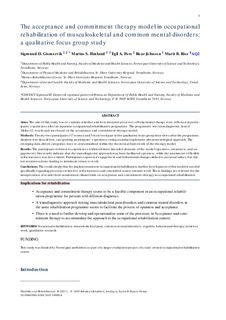| dc.contributor.author | Gismervik, Sigmund Østgård | |
| dc.contributor.author | Fimland, Marius Steiro | |
| dc.contributor.author | Fors, Egil Andreas | |
| dc.contributor.author | Johnsen, Roar | |
| dc.contributor.author | Rise, Marit By | |
| dc.date.accessioned | 2018-10-05T11:49:08Z | |
| dc.date.available | 2018-10-05T11:49:08Z | |
| dc.date.created | 2018-09-28T21:57:23Z | |
| dc.date.issued | 2018 | |
| dc.identifier.citation | Disability and Rehabilitation. 2018, 1-11. | nb_NO |
| dc.identifier.issn | 0963-8288 | |
| dc.identifier.uri | http://hdl.handle.net/11250/2566671 | |
| dc.description.abstract | Aims: The aim of this study was to examine whether and how intended processes of behavioural change were reflected in participants’ experiences after an inpatient occupational rehabilitation programme. The programme was transdiagnostic, lasted 3½ weeks and was based on the acceptance and commitment therapy model.
Methods: Twenty-two participants (17 women and 5 men) took part in five qualitative focus group interviews after the programme. Analysis was data-driven, categorising participants’ experiences using an initial explorative phenomenological approach. The emerging data-driven categories were re-contextualised within the theoretical framework of the therapy model.
Results: The participants referred to experiences within all three intended domains of the model (openness, awareness, and engagement). Our results indicate that the transdiagnostic approach may have facilitated openness, while the attainment of flexible self-awareness was less evident. Participants expressed engagement and behavioural changes linked to personal values, but did not mention actions leading to imminent return to work.
Conclusions: The results imply that for implementation in occupational rehabilitation, further development of this model is needed specifically regarding processes related to self-awareness and committed action towards work. These findings are relevant for the interpretation of results from randomised clinical trials on acceptance and commitment therapy in occupational rehabilitation.
Implications for rehabilitation
Acceptance and commitment therapy seems to be a feasible component in an occupational rehabilitation programme for persons with different diagnoses.
A transdiagnostic approach mixing musculoskeletal pain disorders and common mental disorders in the same rehabilitation programme seems to facilitate the process of openness and acceptance.
There is a need to further develop and operationalise some of the processes in Acceptance and commitment therapy to accommodate the approach to the occupational rehabilitation context. | nb_NO |
| dc.language.iso | eng | nb_NO |
| dc.publisher | Taylor & Francis | nb_NO |
| dc.title | The acceptance and commitment therapy model in occupational rehabilitation of musculoskeletal and common mental disorders: a qualitative focus group study | nb_NO |
| dc.title.alternative | The acceptance and commitment therapy model in occupational rehabilitation of musculoskeletal and common mental disorders: a qualitative focus group study | nb_NO |
| dc.type | Journal article | nb_NO |
| dc.description.version | acceptedVersion | nb_NO |
| dc.source.pagenumber | 1-11 | nb_NO |
| dc.source.journal | Disability and Rehabilitation | nb_NO |
| dc.identifier.doi | 10.1080/09638288.2018.1490824 | |
| dc.identifier.cristin | 1616020 | |
| dc.description.localcode | Locked until 16.8.2019 due to copyright restrictions. This is an [Accepted Manuscript] of an article published by Taylor & Francis in [Disability and Rehabilitation] on [16 Aug 2018], available at https://www.tandfonline.com/doi/full/10.1080/09638288.2018.1490824 | nb_NO |
| cristin.unitcode | 194,65,20,0 | |
| cristin.unitcode | 194,65,35,0 | |
| cristin.unitname | Institutt for samfunnsmedisin og sykepleie | |
| cristin.unitname | Institutt for psykisk helse | |
| cristin.ispublished | true | |
| cristin.fulltext | postprint | |
| cristin.qualitycode | 1 | |
